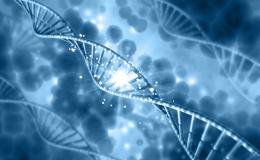Is Pancreatic Cancer Hereditary?
November 17, 2020
Pancreatic cancer is cancer that starts in the pancreas, a small organ near the stomach that helps with digestion and regulates blood sugar levels in the body. The cancer is associated with a poor prognosis as many cases are detected at advanced stages, when the disease is more difficult to effectively treat.

Importantly, many people may not be aware that pancreatic cancer can be hereditary, or passed on from an affected parent to their child. In recognition of Pancreatic Cancer Awareness Month this November, we take a closer look at hereditary pancreatic cancer and what to do if the disease runs in your family.
First, it’s important to understand that cancer is a genetic disease. Cancer develops when genes responsible for carefully regulating the growth and division of a cell (the cell cycle) are changed (mutated) in a harmful way. These mutations accumulate in a cell over time, and sometimes, enough genes are adversely changed for the cell to become cancerous and divide uncontrollably.
Hereditary cancers, unlike sporadic (nonhereditary) cancers, are caused by inherited gene mutations that are present in virtually every cell of an affected individual’s body from birth. And because cancer is caused by the accumulation of genetic mutations, harboring one defective copy of a cell cycle regulation gene in nearly every cell increases an individual’s chance of acquiring enough mutations for a cell to become cancerous. Importantly, not every person with a hereditary cancer gene mutation will develop cancer in their lifetime, but the mutation will increase the risk of developing the disease.
Most of the causative gene mutations discovered for hereditary forms of pancreatic cancer thus far are associated with hereditary cancer syndromes that increase an individual’s risk of developing a number of different types of cancer. A list of some of the genes and hereditary cancer syndromes associated with increased pancreatic cancer risk are listed below.
Gene name Hereditary cancer syndrome
BRCA2, PALB2, BRCA1 Hereditary breast and ovarian cancer
syndrome
STK11 Peutz-Jeghers syndrome
MLH1, MSH2, MSH6, PMS2, EPCAM Lynch syndrome
CDKN2A Familial malignant melanoma syndrome
Hereditary pancreatic cancer is also associated with hereditary pancreatitis, which is caused by mutations in the trypsinogen gene (PRSS1) and others, including SPINK1, PRSS2 and CFTR. Additionally, mutations in the ATM gene are associated with increased pancreatic cancer risk, in both monoallelic (harboring one mutation) carriers and biallelic (harboring two mutations) individuals with ataxia telangiectasia, a rare, progressive movement disorder.
Together, hereditary forms of pancreatitis and the cancer syndromes mentioned above increase an individual’s relative pancreatic cancer risk to between 3- and 132-fold the rate of an unaffected individual, depending on the specific gene mutation.1 Importantly, the gene mutations reported here account for only about 20% of hereditary cases of pancreatic cancer, as additional genes associated with the disease have yet to be discovered.2 Cases of pancreatic cancer that run in a family without a known causative mutation are considered familial pancreatic cancers that increase a family member’s risk of developing the disease between 2- and 32-fold, depending on the number of first-degree relatives diagnosed with the disease.1
Roughly ten percent of pancreatic cancer diagnoses are thought to be hereditary. If you have a family history of pancreatic cancer, particularly on one side of your family, it is important to discuss your family’s medical history with your doctor to better assess your hereditary risk. Affected parents typically have a 50% chance of passing a hereditary cancer syndrome on to their child, and fortunately, comprehensive hereditary cancer tests are available to detect mutations in an entire panel of genes associated with cancer syndromes. Importantly, because pancreatic cancer is associated with such a poor prognosis, accurately assessing your hereditary risk for the disease may facilitate better disease screening and earlier diagnosis. The Kailos Genetics ExpedioTM Hereditary Cancer Screening test screens 33 genes associated with hereditary cancer syndromes, including all of the hereditary cancer genes mentioned here. Click here to learn more about ExpedioTM or contact us with any questions you may have regarding our genetic screening services.




